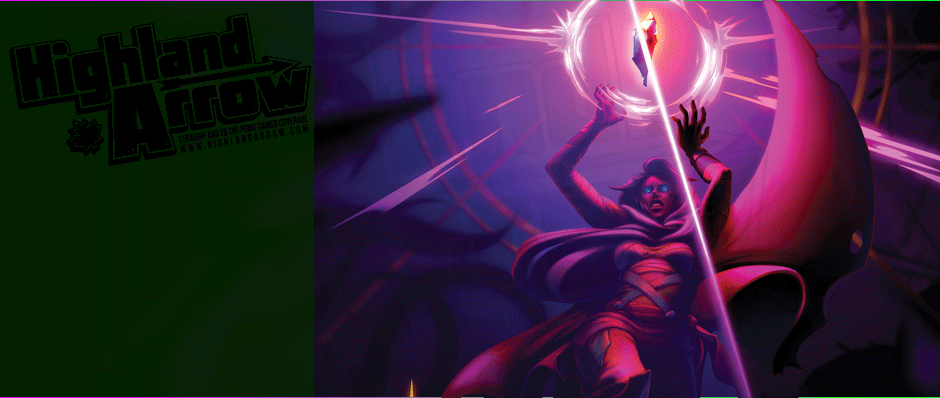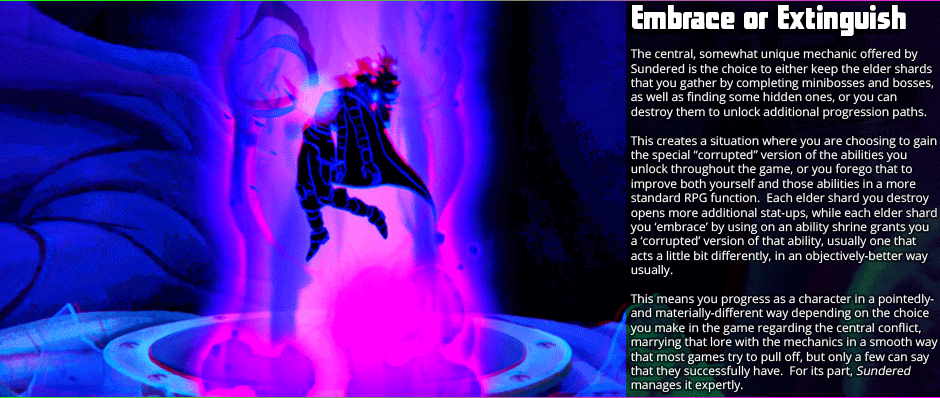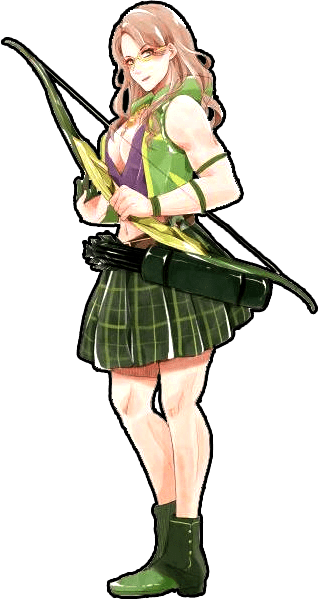


Sundered
Platforms: PC, Linux, Mac
Reviewed on: PC
Reviewer: Maiyannah Bishop
Review Play-Time: 31h
Developer: Thunder Lotus Games
Publisher: Thunder Lotus Games
Released: 2017-07-28
Review Published: 2020-04-02
Review Updated: 2020-04-04
+ Absolutely gorgeous art and animation
+ Atmospheric soundtrack
+ Well-done voice acting
+ Interesting dual advancement system
- Rough controls
- Horde mechanic is more annoying than challenging
- Largely uninspired boss fights
- Shallow brawling mechanics
- Frustrating platforming in the latter section

Editor's Note: Sundered was gifted to Maiyannah for her birthday by her partner.
Sundered is a metroidvania-style action platformer developed and published by Thunder Lotus Games. It is a game I had gifted to me for my birthday, and initially I went into it with strong first impressions, based on the beautiful art style, sound direction, and music. That initial impression eventually faded to a just okay, kinda mediocre feeling where some of the cracks and rough edges made it feel like an unfinished game, but - well, the initial pleasures of a good art direction fade as they become routine, while the quibbles and problems add up, and by the end of the game, frankly I'd gotten to what is the final boss, seen what I had to do to beat it after a couple failed attempts, and I was done. I was not longer going to force myself to play this game I frankly wasn't enjoying playing, and well, if I'm forcing myself to play a game to begin with, that's kind of the review right there, ainnit? But let's break it down all the same.
A Beautiful Madness
Let's not gloss over what initially drew me in and gave me a strong first impression of Sundered: the art direction is nothing short of breath-taking. A gorgeously-flowing animation complements an artistic style with a lot of polish and flair. Each of the different areas you traverse through has its own unique theme and spin, and yet they all appear cohesive and part of a singular whole. The fluidity of the animation left me thinking back fondly to popular step-platformers of the past, specifically Delphine Software's Out of this World (aka Another World) and Flashback games, both of which had great animation that quite added to the game experience. Everything that the player character Eshe does is rendered amazingly well, and gives the character a feeling of motion and speed that compliments the frenetic pace of a lot of the brawling that you'll be doing through the game. It's the kind of quality of animation that obviously took a lot of care and effort, and that makes it all the more frustrating that I had the problems I did in the game - but we'll circle back round to that below.
Complimenting the gorgeous art and animation is a well-done and atmospheric soundtrack by composer Max LL - one that I liked enough that I bought the soundtrack DLC separately from the game to get it. It adds a dark and foreboding feeling to the already grim atmosphere skillfully. I lack the depth of vocabulary and experience to really relate what I feel the music did well, but it definitely fits, and always feels at home in the game, rather than grating or feeling dissonant. Likewise, while the sound design is often easy to gloss over, there's a lot of subtle touches to the sound design in Sundered that stand out, such as the breathing of the main character - used sparingly for effect - or the attention given to matching the sound of the footsteps to that of the character's movements.
Descending Deeper...
Would, oh would have the developers have paid as close care and attention to the controls, this is a game I could probably recommend; albeit weakly so given the other problems, but this is a fundamental misstep for a brawler or step-platformer to make, and one made in spades here. This game has caltrops laid across both possible control roads: the controller and keyboard controls both have separate problems which keep them from working as they should. Personally, I ended up using the keyboard as I found its problems less egregious but still enough of an issue that I needed to play this game in several stints across a couple weeks. I'd just have a section that compounds the problems - we'll touch on how following this, below - and would just need to stop.
The problem which the controller and PC have both come down to feeling loose. Allow me to expand on what I mean by "loose". This appears to be an intentional design decision: they are attempting to give the main character and protagonist, Eshe, a feeling of weight and momentum in her movement, and there is usually a moment before she changes direction. This makes a couple maneuvers that are sundry and common in the game particularly difficult. On the controller, the jump seems to have a certain input delay, which makes any precision with the platforming impossible. It's worth noting that the precision is required mostly for combat, and there is not much puzzle platforming going on here, but it still makes that combat much more frustrating than it needs to be. However, switching to the keyboard did not provide complete relief: while it did not have that delay, it had difficulty doing the wall-jumping that is used through a lot of the game. It makes it require very precise keypresses (analog vs digital, one supposes), and means that more often than not I was falling off a wall rather than jumping off it. I found it more palatable than a consistent input delay on jumps, but I was happy with neither, and if I were so bold, I'd assume the reader likely feels the same. In an action platformer like Sundered essentially is, even if it seems to be trying to be something different, the controls need to be tight and responsive, rather than loose as they are here. The protagonist is the one who's supposed to be affected by the eldritch, not my controller.
Dizzying Heights
There are three sections to the game that you're expected to navigate with those controls: the initial first area, a sort of eldritch city ruin, and an open-air high-rise cathedral area. They have their own unique names and whatnot, but beyond the lore we'll get to below, that has little meaning. They're three different flavours: "eldritch", "neutral", and "humanity" which can be understood as good. And if the intention of the game is to make us want to descend into that darkness of the eldritch, it does a good job of it with the Cathedral, an infuriating gauntlet which collects a number of environmental gimmicks that make the already loose controls all the more likely to result in someone damaging their controller, ties them together with a bow, and then expects you to fight in that environment on top of that foul-tasting combination of mechanics.
Any single one of the mechanics taken in isolation would be irritating, but not so egregious. You have a few: a severe reliance on grapple-hook points, a wind mechanic that pushes you around, and a tunnel travel system. The frequency of the grapple points, including the fact that they're pretty much required in the main boss fight that the cathedral culminates in, makes a joypad controller like the Xbox controller or DualShock especially problematic, that jump delay is also felt in releasing the grapple from the point, so it throws off timing in a way that you can probably eventually adapt to, but I at least was unwilling to. The wind mechanic compounds that problem if you're on a controller, but also is frustrating on a keyboard too: you're pushed around in random directions as winds ebb and flow, and it makes it very difficult to control an already-temperamental character. Yeah, you know that jump you need to do? It's over an abyss that will kill you. And also the game is going to randomly decide to fuck you. I mean, I'm sorry for the language, but that represents the most direct way to convey what I was getting from the game at this point. I hesitate to even call it artificial difficulty, because this isn't difficulty so much as it's the game deciding "well, you're just going to die now." That is probably the more egregious of the three, to me personally.
The wind isn't the last however: that honour lies with the tunnel-travel system. Now, someone familiar with the game might be wondering why I'm mentioning that as a troubled mechanic, because on it's face, a fast travel system seems like a good idea. You have a game where when you die, you respawn at the very beginning, and yes while you still maintain your upgrades and can even grab more when you're back at that starting point, you still have to commute back to the point where you died to continue. So .. a fast travel system in that case seems like a good idea, right? Well, yes, again, on its face its a brilliant idea, cutting out a large of that commute. But it's a problem the game has created itself and offered a half-solution to. You are still having to commute again, and with the difficulty of the boss in the citadel, it did not take more than a couple of times having to retry that boss because a grapple point decided to yeet me entirely too far in the wrong direction before I found it growing very obnoxious, exceedingly quickly. One of the best ways to alleviate feelings of unfairness or the other wages of artificial difficulty (or in this case, the commute issue), is to make the time to reset as short as possible. Sundered has taken its inspiration from Dark Souls here, without recognizing the different environment which made the longer reset work in that context. In the end, its just obnoxious.
Any one of those is likely enough for many players to find a pet peeve in the game, for me that wind definitely was one given the control difficulties to begin with, but taken all three at the same time in whole, and you have a recipe for disaster, and ultimately, the combination of slippery controls and level design that only compounds the problem, informs greatly my negative opinions about the game.

Another thing that really does the lore some service is some particularly well-designed sound design. I often only really mention this kind of thing if it's particularly poorly done in a way where it stands out, but Sundered is a game that really stands out in that regard, at least when it is not hopeless overdoing it in pretty much every bit of the combat - but we'll come back to that point below. There's a lot of subtle bits of sound design in the game that help make it very atmospheric. One that stood out to me was the breaths of the player character as she does some of the acrobatics moving around. Such is a subtle and small thing, but it goes a long way towards conveying the atmosphere - and is a lot of why I find frustration in the game flubbing the atmosphere - it got so very close to nailing it, and then tossed it all away.
Ephemeral
It has been pointed out to me more than once in discussing the game and my frustrations with it that the platform may be forgiven if the brawling is acceptable; the platforming is only half of the equation in an action platformer after all, and while Eldritch seems better suited in its controls to a step platform, it is trying its best to be a brawler. In case the first sentence didn't communicate that the brawling wasn't well-suited to the game, well, let me be clear: it doesn't. The brawling is the piece I lead into with the slipperiness of the control and difficulty of the platforming in general due to them, because the brawling would be where the rubber meets the road here: you need to be able to move fluidly and precisely to achieve skillful play with a brawler.
Whatever its goal may be in throwing so many enemies at you, it fails in both counts I can think of: trying to create a sense of oppression suitable to the horror-themed atmosphere, and trying to offer a dynamic and fast-paced action element. The two don't really gel well at the best of times, because horror is best when you feel powerless, generally, not when you feel powerful. However, that becomes a moot point with Sundered, because it would fail in both counts. Firstly, if you're trying to create the feeling of oppression then well, you definitely don't want your main character to be demolishing all these horrors with relative ease, only ever really challenged if they are absolutely mobbed, and even then, not that much. It undercuts any feeling of threat that these horrors may present to the player. Secondly, if they were trying to create a fast-paced action, well I have to admit they kind of succeed here, to at least some degree, but there is no skill at play here. You can get through most encounters just mashing the mouse button like you're playing Diablo hyped up on methamphetamine or something - and indeed, I have no shame in admitting this was my approach, because attempting anything greater required engaging in controls. While there's some places that Sundered does hit when it comes to the lore it is constructing, the combat sure isn't one of them. It's unoffensive and unchallenging, but adds little to the game, and being the main mechanic, it overstays its welcome by quite a time.
It Hurts, It Hurts...
I mentioned on how the horde mechanics really stymie the game above, but only touched on it in brief - let's expand on that fully. Rather than have enemies placed on the level, or even have "spawns" or a similar mechanic to generate them, what the game does is instead lifted from the Left 4 Dead series, where an algorithm will determine at certain intervals to drop a bunch of enemies on you. Now, that worked in Left 4 Dead, partly because, as my more astute of readers whom have played the series will know, it did this on top of having a certain amount of pre-placed enemies, but also because it was tuned in such a way that it would try to challenge the player. It tried to adjust the difficulty level to be what the player could handle. It did not always succeed at that, but the attempt was made.
Sundered fails on both regards in this - it both fails to make an attempt to adjust difficulty, and more important, does not provide difficulty. Every time that it spawned a group of enemies, it was voluminous, indeed making itself worth of the phrase 'horde mechanic' - but it's a horde of chaff. Mook enemies that are very easy to dispatch. Certainly some are harder than others, and there is variety among them, but even the most difficult ones are enemies you can be windmill-bashing on your controls to attack and you'll never have to worry about changing up tactics or being more intelligent in facing them. You're never pushed or pressed to have to worry about positioning, the style of your attack, or using some of your abilities like the cannon. Just keep moving and keep bashing the attack button and you'll be fine. Now, I haven't actually had a problem with fairly mindless brawlers or crawlers in the past - as long-time readers can attest I called Diablo III a good "popcorn game" for the mindless nights, but in this case, even Diablo had more depth and meat to its combat. It had different skills and different play-styles that they supported. While you do often fall into one pattern of attack and behaviour around that attack, you still had a variety of approaches available utilized by the various classes and the few routes in each. Sundered limp-wristed at best tries to do this, but it doesn't succeed. The cannon never has enough energy to favour a ranged approach over just mashing melee, and more importantly, even in the design its meant more as a sort of "screen clear" in the more bullet-hell shooter sort than a different combat style. The brawling has the depth of a tea spoon, and so there's not much there to engage interest over any real length of times. It is a very ephemeral mechanic.
I have spoken in the past about how some games use random-generation mechanics as all-purpose game design cavity filter, and while I generally try to be slow to call something "lazy" in that sort of way, it definitely seems to be the case here. Rather than careful enemy placement you have random hordes - that fill randomly-generated levels. It results in combat that is shallow, not very memorable, and very quickly it fades into a white noise. That's not necessarily bad, but when the game has so little already going for it other than the art design, it makes it difficult to recommend as a game. We're here to interact with the pretty things, not just look at them.
The Edge of Madness
The argument could be made that a good start with a tedious middle could still be worthwhile if it was in aid of a final climatic end that was rewarding. Well, I'd agree, but it simply is not the case with Sundered. The boss fights in Sundered are a final exam of the mechanics, sure, which will please the people who are adherents of that particular game design philosophy, but that is also the downfall of the boss fight to me - because the mechanics are sloppy, simple, and shallow.
Let me use the first boss fight as an example - it is essentially used as a tutorial about boss fights and thus isn't really much of a spoiler as a result. It is a gigantic boss that goes across a multiple-screen arena, and requires you to navigate several platforms to hit a handful of weak points on the boss. This appears to be an attempt to require platforming skill to beat the boss, but it doesn't really achieve that goal, because it has the same failure of the brawling combat. It takes a bullet hell approach to trying to keep you mobile by spawning a bunch of projectiles, but the reason that it fails in this aspect is that it doesn't make you move enough and far enough - you can keep smashing while moving and still be hitting the weak point. As a result, you're not effectively hindered. Moreover, the projectiles and spawned enemies aren't really difficult enough to be an actual threat to the player in and of themselves. The projectiles move too slowly and the enemies die too quickly without you stopping mashing for them to damage you. So ... it just becomes a button-mash with the occasional screen-wide communte to pad out the fight. It's as tepid and uninteresting as the rest of the content, and I have to say, when I got to the last fight, I was one shard short of the pure "corruption" ending and I ran entirely out of patience to figure out where I missed it, so I just bum-rushed to the end and dealt with receiving the "neutral" ending. And well, to speak frankly, to say that I ended the game relieved that I was done playing it, could be a sufficient review in and of itself.


